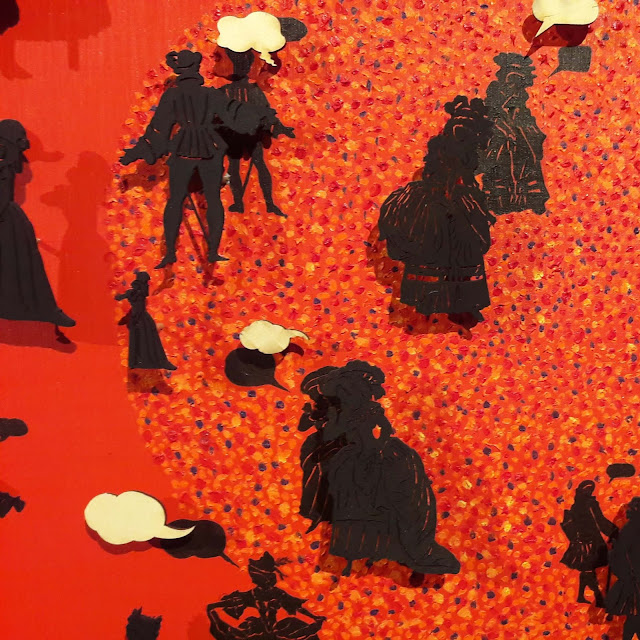 William Waterhouse, Narcissus and Echo, 1903
William Waterhouse, Narcissus and Echo, 1903
“Narcissus and Echo” is one of my favourite works of William Waterhouse. Narcissus keeps looking at the reflection of his beloved grand figure on the lake. What intrigues me most in this work is not Narcissus himself who stares at his reflection on the mirror/lake with a “fatal” admiration, but rather the “echo” that eyes him woefully. The tragedy of Echo stems from her dependence on Narcissus. The “echo” does not have a voice of her own. She needs the voice of narcissus to speak out. She can only reflect the voice of narcissus. However, Narcissus, who is in a fatal, eternal and elliptic “love” with his own image, will never utter a voice which can be echoed because Narcissus dwells in an eternally circular universe “replete with” and revolving around his image in total silence. He has no voice. There is no “other” in the inner world of narcissus. He never sees anyone other than his own image. He does not hear the voices from the outside world. The inner world of Narcissus, who is “in love with his own image”, is indeed very desolate. An inner world that is “dark/lightless/silent”, and also miserable as much…
In fact, mythology provides us with a road map concerning the future of Narcissus. The story of Narcissus is a fatal one. He disappears in his own image, in his love directed towards himself without seeing, highly tragically, the universe and the others surrounding him; on the other hand, what is told about “echo” has never even been recorded by the imagery of the majority. Echo is “condemned” to abide in an eternal silence chasing Narcissus to echo his voice; in this process it falls of the face of earth leaving nothing but an “echo” behind. I am more interested in the silence of Echo than the death of Narcissus.
The power of mythology resides in its ability to create universal and eternal “archetypes” or its potential to “rename” the existing ones.
Inspired by mythology, psychoanalysis provides us with very significant hints about narcissistically inclined person and the dependent “other”.
Narcissus and Echo, Pompei, 45-79 AD
Understanding Narcissism
The psychoanalytical theory based on long-term clinical observations provides us with a significant road map to understand the narcissistic person. Narcissistic person is the one who is not capable of seeing and hearing anything other than himself, as narrated in the myth of “narcissus”.
There is a growing conviction among mental health professionals that “narcissistic” personality disorder has escalated in our time. Genders attributed to narcissus and echo in mythology are not indeed “coincidental” since the current statistics indicate that men constitute the majority of the population diagnosed with narcissistic personality disorder (three out of four).
Parallel to the statistics, I have come to see, in my immediate vicinity, men inclined to narcissism and echoes/women dependent on them.
A young man and a woman are sitting face to face in a chic café in Tunel. The young, blond woman is a beautiful mirror… she keeps listening to him. The man keeps telling his achievements, opinions and goals in life looking at his reflection on the mirror. Echo does nothing but listening, shaking her head without neglecting to smile in a flirty manner. Admirably, she stares at her boyfriend. However, the man does not see the eyes of his girlfriend; rather, he sees the admiration in her eyes. I am hoping that the mirror never falls apart. The sustainability of this relationship depends on the perpetuity of the mirror and the echo’s keeping her silence.
The biological basis supporting more commonplace appearance of narcissistic tendencies in men is for sure highly important. However, I am more interested in the psychic processes of this society that create “narcissistic” men and “echo” women.
The theory tells us that everyone has a certain degree of narcissism – self-love. This self-love becomes fatal, though, in case of overdose. Extremely narcissistic people cannot feel the emotions of the others, what makes them happy or hurts them. They cannot understand others’ perspectives. They dwell in an infantile –self-centered– universe revolving around their emotions, needs and thoughts. Others are nothing but “instruments” to realize their fantasies, desires and goals. Others have no “independent” existence from the point of view of narcissistic people. Other people only exist to meet their desires and needs, and they are “others” that can be easily dispensed with.
Narcissistic person is not interested in the person he interacts with; rather he is concerned with the mirror s/he holds. He sees the admiration in your eyes, not you. He is not concerned about you, but about your approval, appreciation, attention and admiration. You can be easily substituted by “another” when the echo in your eyes changes and when you no longer mirror his grandiosity as much. You are nonexistent in the world of narcissistic person.
Narcissist lives in a self-appointed world. He believes he is entitled to all privileges. He never cares about how you are affected by the decisions he takes based on his desires, needs and opinions. He is not concerned about your sorrow, joy and injuries. He is only concerned about the reflections of such situations on him.
Narcissistic people have a superficial emotional world. Underlying any possible sophisticated and intellectual appearance, there is a highly infantile, primitive and superficial emotional world and construct. When you have the strength and courage to look at him closely, you see this infantile world with its giants and dwarfs, immortal life, potion of eternity, princes charming, maiden princesses and invincible powers. In his infantile emotional world, the narcissistic person imagines a life where he defeats, rules and dominates over everyone, never suffers, is served by everyone, and has immortal omnipotence. You are nothing but “objects” that exist to perform certain functions in his emotional world. You provide him with a reflection in your mirror, a supplement to his self-admiration in your beauty, and resources to his goal in your prosperity. You can very well be substituted with a more enduring mirror, a more beautiful woman, or more ample resources… Narcissistic person never empathizes. He is not concerned over what it feels like for you to be abandoned, substituted, excluded, or ignored. He does not have compassion. He considers your emotions as unnecessary “things” that impede him and waste his time.
Narcissistic personalities are highly successful in hiding their inner emotional emptiness. Their beautiful and lovely images, elegant appearance, expensive clothes, trendy automobiles, dramatic speeches only conceal the underlying “emptiness.”
Narcissistic personalities believe they are “totally” good. They project their negative feelings for others to “carry”. They feel no responsibility for anything at all, just as they project negative feelings onto others rather than “confronting” and “accepting” them. Those in close contact with narcissistic people begin to “carry” and even “internalize” their depression and anxieties. It is all your fault and insufficiency, and thus you are responsible for bearing the burden of those feelings.
One of the most distinctive characteristics of narcissistic personality is the narcissistic anger bursting out when their “mirror is broken.” Narcissists are angry people. They get angry when you do not obey, when you criticize them, when you cannot sufficiently mirror their “grandiosity”, when you express your own emotions and thoughts, when you mention your own existence and needs. Their narcissistic vulnerability might be regarded as a reflection of their “emotionality”. However, narcissistic person is emotionally oriented neither to you nor anyone else. They are only oriented to themselves.
Another basic characteristic of people with narcissistic personality organization is that they cannot mourn. People mourn for their losses. Any kind of loss is accompanied with mourning. The mourning period including denial, anger, depression and acceptance is painful. However, people with predominant narcissistic characteristics can not mourn. As if the person that is gone has never been there. They can easily substitute “it” with another person.
At the deepest level, narcissistic people are “isolated,” “superficial,” “lonely” and extremely “unhappy” without the capacity to love someone, to empathize and to mourn. They drive all kinds of psychic energy that they lack through exploiting the emotional resources of “others”. They shift to someone else when the emotional resources of people in their lives are depleted.
Narcissus and Gender, or Revisiting Oedipal Love
It is by no means surprising that in the prevailing culture of our time, narcissistic personality tendencies are –in line with global statistics– predominant in men. Yes, in this country, men with highly narcissistic characteristics aspire to be on the center and dominant; referring to a self-appointed morality, they never regard what they ask for themselves as acceptable for the opposite sex. In their psychic universe “split” through their puritan morality, they position the all-entitled man as opposed to its dialectical antagonist, and regard it justifiable to punish or even murder women who challenge this position. This narcissistic masculine orientation that positions women as the “other” or “deficient” and themselves as “omnipotent” and “central” regards woman only as an object that “mirrors”, “holds”, or “contains” him. The same narcissistic masculine orientation regards women as substitutable objects and ignores woman’s subjectivity. In this sense, the relationship between women and men is not an intersubjective one. Rather, it is a relationship between the narcissistic male and his narcissistic female extension.
In this respect, what is encoded in Turkish culture as “love between the sexes” is in fact a form of domination. Healthy love acknowledges the subjectivity of the “other” and establishes a relationship between different subjectivities by respecting each other’s boundaries. Narcissistic love regards the “other” as one of its organs, or as an extension, and aspires to control the other. It does not acknowledge the subjectivity, subjective choices and tendencies of the other.
Ipek Duben – Love Book
In this respect, I believe that Ipek Duben’s conceptual work “Love Book” is highly significant. Duben unfolds “psychopathy”, which is the ultimate form of masculine narcissism in this country: domination of masculine over feminine, of men over women… Love Book is a very important work in that it brings to light different forms of violence against women in Turkey. I believe that the “irony” in the title is extremely important, since violence is disguised as “love” in this country. It is encoded as love. I think what is mentioned here is “narcissistic love” and resulting “narcissistic injury and anger”. The man, who loves not the woman, but his power and domination over her, deems it justifiable to exert violence and even murder the woman when his “object” loves or desires “somebody else”. The misogynistic aspect of our predominant culture appalls me.
What feeds narcissism in this country that men are inclined to develop? I believe this is a very important and central question. What makes men in this country so strongly feel that they are over and above everything, at the center, entitled to anything, and privileged? How come they have a privileged justice? How come they develop a “super ego” that allows them to regard women as objects in every sense?
Bronzino, Venus, Cupid, Folly and Time, 1546
At this point, I think of the famous work of Bronzino, “Venus, Cupid, Folly and Time”. Depicting the incestuous love of Aphrodite and his son Eros, Bronzino makes an important annotation to oedipal love.
Freud reveals that the biggest love is between mother and son. Freud, having theorized oedipal love in the beginning of 20th century Vienna, makes a significant estimation for contemporary Turkey. Motherhood is the only sphere for woman to freely experience her “desire” in this culture where all –visual, social and emotional– forms of feminine desire are repressed. Turkish women, who cannot choose their spouses in most cases, or make their choices “logically”, which means repressing “desire”, are never at liberty to experience their passion towards the opposite sex in an unmediated way. The feminine desire, which is “covered”, “concealed”, “repressed” and “ignored” in parallel with the currently rising conservative wave in Turkey, expresses itself in motherhood with an “uncontrollable” force. Turkish women who do not fall in love with or feel desire for their spouses become infatuated with their “sons”. This is such a passionate love that everything the son does is perceived as “acceptable” and “justifiable”. He is granted with unrestricted “freedom”, “blessed”, and “mirrored” with infinite admiration… She gives him the message that he has absolute power, he is special, and privileged above all else. All people in life and particularly women are “others” who are only there to serve them.
Hale Tenger – I know people like this, too
In this respect, I would like to refer to the conceptual work of Hale Tenger, titled “I know people like this, too,” which deeply impressed me when I saw it years ago at the Istanbul Biennial. Tenger so courageously undersigns a very significant conceptual work that “mirrors” our society and shows how phallic narcissism surrounds and shapes it.
The mother has a fundamental role in the constitution of personality. The mother provides the child with a road map to understand himself and the outside world. Such road maps are not changed as easily as it is thought, even after long years of therapy. As Freud said, “Child is the father of man,” and the road maps we acquire in our early childhood chase us throughout our lives like a shadow. That’s what unconscious is all about. It is comprised of the messages our mothers whisper to our ears, and conveys us with her eyes and her touch since the period when the verbal has not even emerged. The unconscious is basically the voice of our inner mother. The voice of the mother who tells us that we are divine, sublime, different than others, superior to them, and omnipotent.
I believe that the voice whispered to men’s ears in this land since infancy gives “very dangerous” messages, and feeds the pathological narcissism prevailing in them… Yes, the love of mothers to their sons in this country is extremely blind and blinding… Yes, women in this land do not believe in love towards the opposite sex, but they rather believe in a highly calculating, logical, even “arithmetical” relationship with men. They even ostracize and repress erotic desire towards the opposite sex by regarding it “dirty,” “sinful” and humiliating,” and unfortunately, “transfer” this highly “humane desire” to their sons.
The love of mothers towards their sons puts them in such a central, special, different, superior and privileged “throne” that men whose narcissistic tendencies are “sharpened” turn into “narcissuses” not seeing, hearing, or perceiving anything but their own being, needs and priorities. Like in the myth of Narcissus and echo, they lead a life admiring their self-image.
The Tragedy of Echo
Narcissus is the protagonist in this myth while echo is nothing but a shadow, just like the women involved in relationship with narcissistic men. I am more interested in the tragedy of “echo” in this land than the position of narcissus. Many women in this land are prepared to play the role of “echo” from birth onward. Women, who are expected to “handle” men, are actually raised to become a “substitute mother” by appropriately “holding”, “mirroring,” or “containing” men’s “narcissistic” tendencies. This is not an easy “task” as it may be presumed to be. Echo needs to give up her own voice… Symbolically, it means that she must give up her own will, and learn to become dependent on narcissus. It means that she needs to ignore her independent perspective, perception and will, to prioritize the needs, desires, perspective and decisions of the man whom she is an extension to, and to accept stepping back to the position of an “echo”.
However
I have not yet given up all my hopes for the possibility of an “intersubjective” relationship between man and woman in this land. In his book “Love Relations,” Kernberg emphasizes the importance of mutual “empathy” and “idealization” while describing “mature love” between the sexes. I believe that the most important concept here is “mutuality”. “Mutuality” requires two separate “subjects”. Only two independent people who are “subjects” can empathize with and idealize one another. In this respect, “maturity” means the capacity to recognize, acknowledge, and respect the being of the other, who is separate and different from us. Mature love is just the love felt towards the “other”.
I think “echo” is the one who will accelerate this process. Narcissus will never wake up from his self-admiring, fatal and cyclical sleep. However, echo has the chance of breaking this pathological cycle she is engaged in with narcissus. “Echo” women in this land will have a chance to experience a new, healthy, mature, “mutual” and grown-up love as much as they have the courage to regain their voice and will; otherwise, they will be condemned to this tragic and sorrowful mythological scenario eternally.
August Rodin, The Kiss, 1889
January 2012 © Mahan Doğrusöz
Translated by: Menekşe Arık










